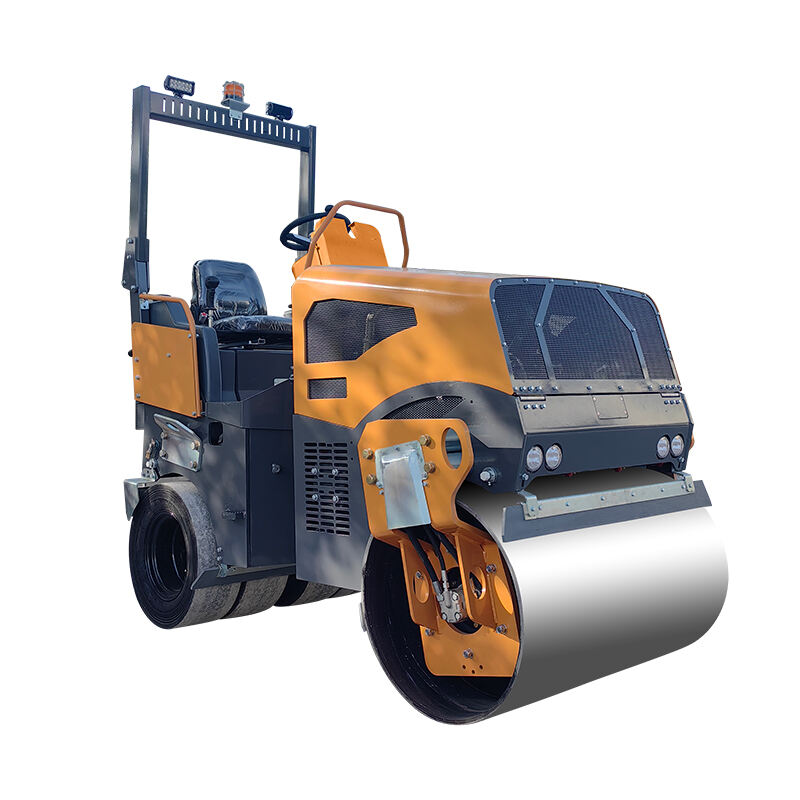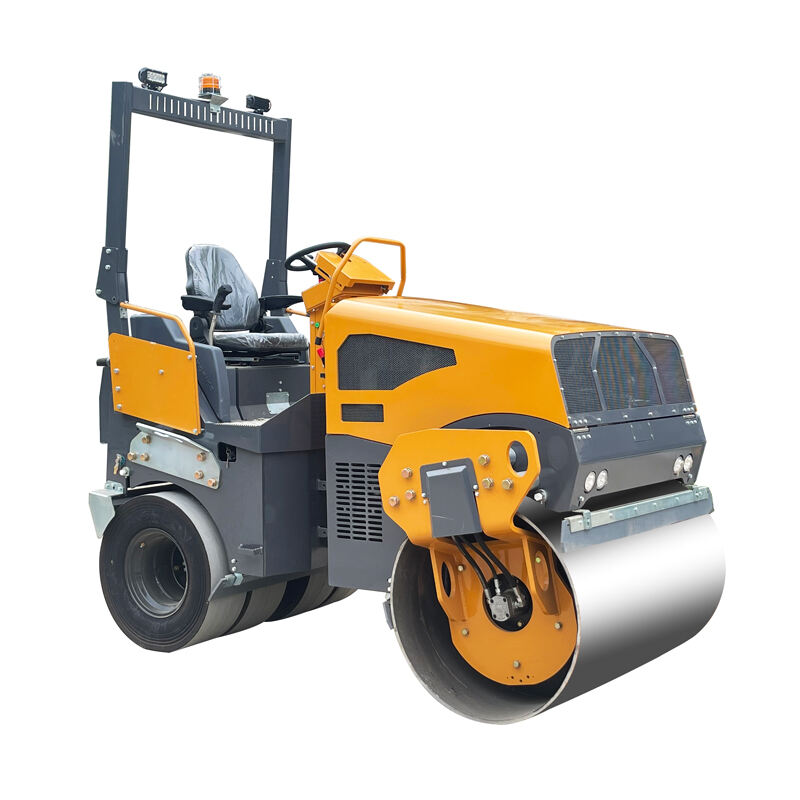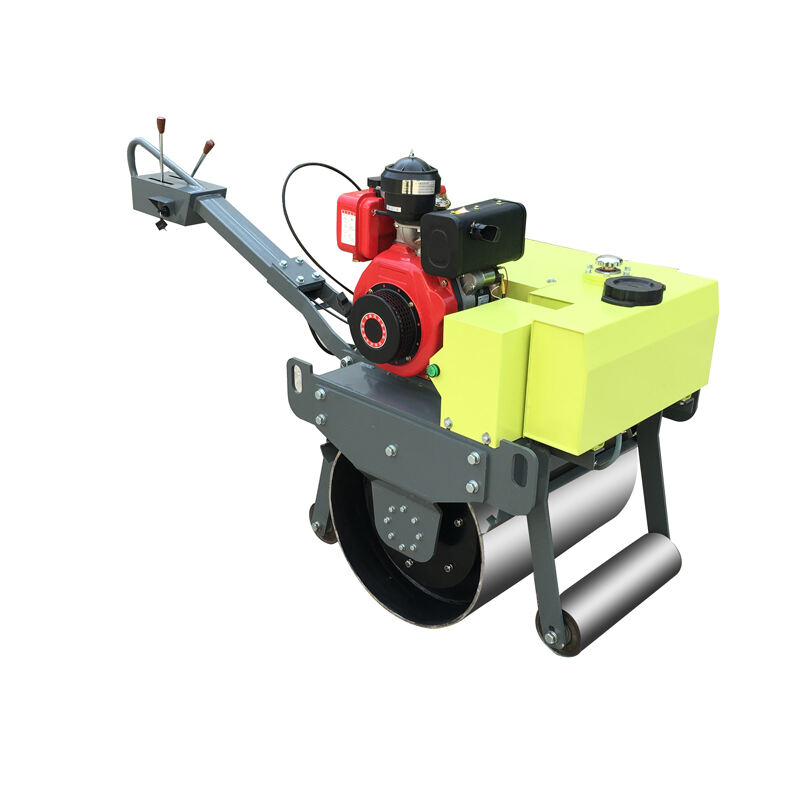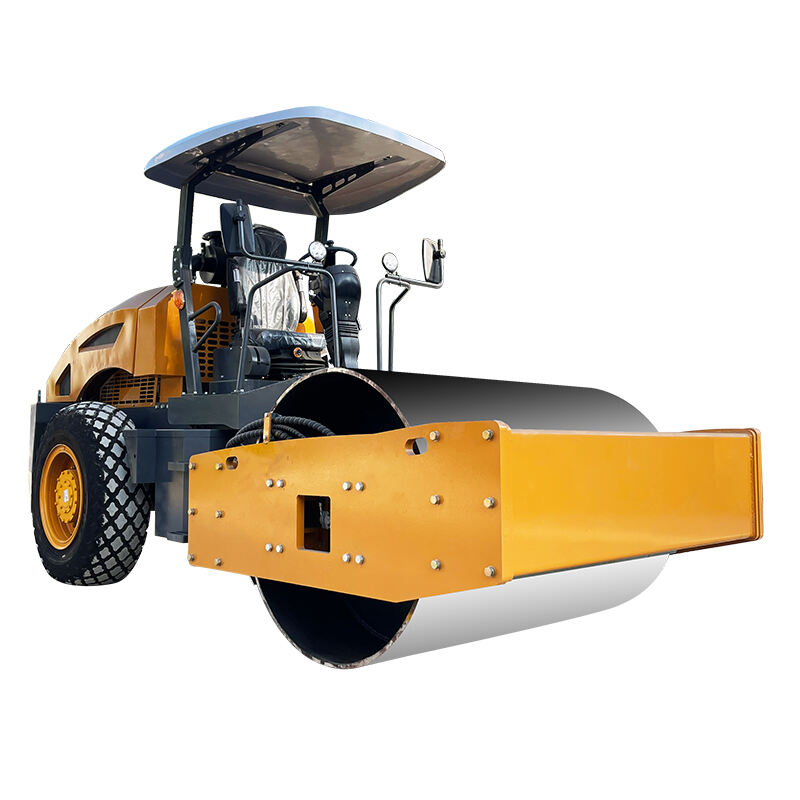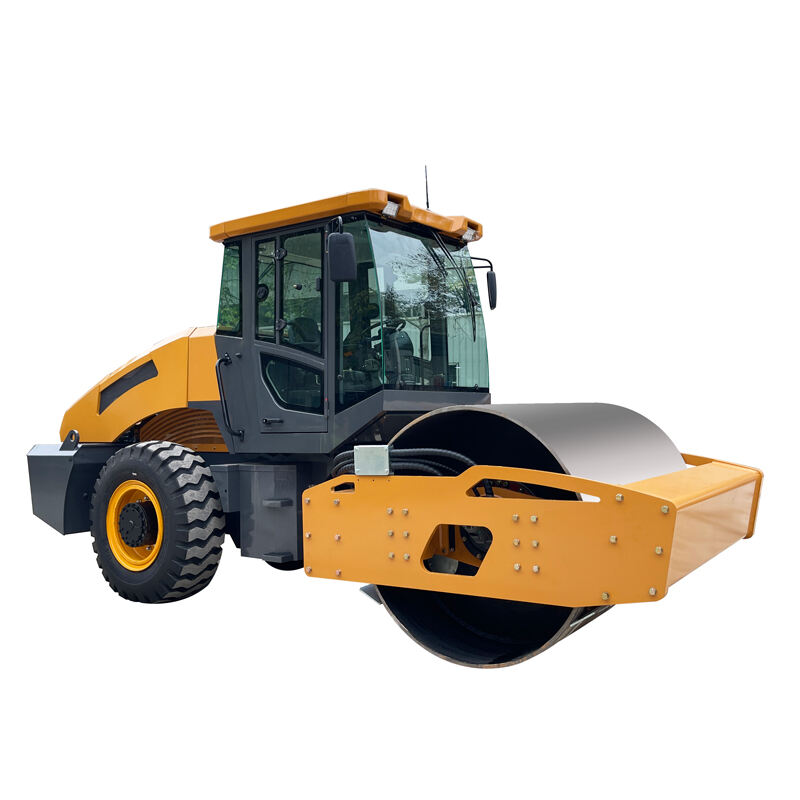Road Rollers: How They Ensure Road Durability
How Road Rollers Enhance Road Durability
The Science Behind Soil and Asphalt Compaction
Getting soil and asphalt properly compacted makes all the difference when building roads that last. When done right, compaction creates a strong base that stops problems down the road like cracking surfaces and annoying potholes everyone hates driving over. The trick lies in getting just the right amount of moisture into the mix while laying down each layer correctly. Contractors actually have to test samples in the field to find that sweet spot where the soil becomes dense enough but still workable. Studies from pavement engineers show that roads built with good compaction can stick around twice as long compared to ones where they rushed through this step. For anyone involved in road construction projects, understanding these basics isn't optional it's absolutely necessary if they want their work to stand up to traffic and weather conditions year after year.
Preventing Structural Failures Through Proper Density
Getting proper compaction right matters a lot when it comes to stopping those annoying road problems we all know too well - cracks forming here and there, plus those pesky potholes that seem to appear overnight. When roads aren't compacted correctly, they just break down faster than normal. Take a look at what happens after heavy rainfalls or snow melts away. The damage adds up quickly, which means fixing them becomes way more expensive over time. Some research points out that bad road building practices, especially when compaction isn't done properly, end up costing around $36 billion every year globally on repairs and upkeep. That's a huge number considering how many countries deal with this issue daily. By checking regularly throughout construction projects and running those density tests at different stages, engineers can catch problems early on. This approach helps keep roads intact for much longer periods while also cutting down on those frustrating maintenance bills that always seem to come out of nowhere.
Vibration Technology's Role in Long-Term Stability
Vibration tech plays a big role in making roads last longer over time. When we talk about road building, these vibrations actually help move particles around, which makes the whole compaction process work better than traditional methods. Getting the frequency right matters a lot too because different materials respond differently. For instance, gravel needs a different approach compared to clay soils. Research from various engineering firms points toward clear benefits when vibration techniques are properly applied during construction. The roads built this way tend to hold up much better against daily traffic wear and tear plus weather conditions. Contractors who've switched to vibration-based approaches report fewer maintenance issues down the line, even though initial setup might take some getting used to.
Exploring Roller Options
Vibratory Rollers Play Key Role in Road Building Projects. These heavy duty machines compact all sorts of materials from dirt to asphalt mixtures, making sure roads end up flat and strong enough to last years. The real magic happens through those powerful vibrations that pack down layers better than static weight alone ever could. For contractors working on everything from loose gravel bases to fresh asphalt铺设, these rollers create that critical base density needed for good road performance over time. Getting hold of a quality vibratory roller represents smart spending for most roadworks budgets since proper compaction directly affects how well the finished surface holds up against traffic wear and weather damage.
Types of Road Rollers for Different Compaction Needs
Smooth Drum Rollers: Ideal for Surface Finishing
Smooth drum rollers play a major role in getting those top-notch finishes on road surfaces. They work mainly by packing down asphalt and various surface materials to create that nice flat, lasting result we all want to see. Most often these machines come into play during the last phase of road building when getting everything level and packed tight matters most. Contractors who've used them report better looking roads that last longer too. Some field studies indicate that incorporating smooth drum rollers cuts down on overall project time without sacrificing quality standards, which makes sense when considering how much smoother operations run with properly compacted surfaces from start to finish.
Pneumatic Rollers: Multi-Purpose Compaction Solutions
Pneumatic rollers are pretty versatile when it comes to compacting different kinds of soil, which is why they work well across so many job sites. The machines typically have several rubber tires that help spread out the pressure evenly during compaction operations. Contractors have found these rollers work great on all sorts of ground conditions from loose sand to heavy clay soils. When looking at the bottom line, pneumatic rollers tend to save money compared to older techniques because they cut down on what crews need to do for stabilizing soil and getting surfaces ready for paving. What really sets them apart though is how easily operators can switch between lighter and heavier compaction tasks without losing quality results, something that has made these machines popular choices throughout the construction industry.
Sheepsfoot Rollers for Cohesive Soil Challenges
Sheepsfoot rollers were designed specifically for dealing with tough cohesive soils that give most equipment trouble. These rollers have those distinctive tapered feet sticking out from their surfaces which make them really good at packing down clay and similar soils that just won't compress properly when using regular smooth rollers. Looking at actual field results from different construction sites shows why these special rollers work so well for getting deep compaction where it matters most in difficult soil conditions. This often means fewer problems later on with road foundations cracking or failing. Cohesive soils tend to hold water and resist compression, but the unique foot design of sheepsfoot rollers breaks through this resistance. Road builders rely on this technology because it creates much more stable bases for highways and roads that last longer without needing repairs.
Key Features of Modern Road Rollers
Adjustable Vibration Frequency Controls
Adjustable vibration frequency controls matter a lot when it comes to making sure the compaction works well for different materials out there. When operators can change the frequency, they're able to match the right amount of force to what's actually on the ground, whether it's dense soil or thin layers of asphalt. Getting this right makes all the difference in how efficiently things get compacted and ultimately affects how good the finished road looks and feels. Wrong settings often cause problems down the line too many folks have seen roads crack prematurely because someone dialed in the vibrations incorrectly. Contractors who take time to fine tune these settings usually end up with better results overall, smoother surfaces that last longer under traffic without developing those annoying bumps and potholes we all hate driving over.
Eco-Friendly Engine Systems
Road rollers today come with green engine options that help meet tougher environmental rules and sustainability targets across the board. The new engines cut down on harmful emissions, which means construction sites produce less pollution overall. Take diesel particulate filters for example they slash soot output by around 80% according to recent tests. Staying within emission limits isn't just about avoiding fines anymore it's become part of what makes a company look good in the eyes of clients and communities alike. When contractors outfit their fleets with these cleaner engines, they check off regulatory boxes while also showing they care about the environment, something that matters more than ever in today's market where green credentials can separate winners from losers.
Ergonomic Operator Cabin Designs
Ergonomic design matters a lot for operator cabins if we want to boost both efficiency and comfort levels. Good ergonomic cabins typically come with adjustable seating options, control panels that make sense at a glance, plus insulation that cuts down on annoying noise levels inside. All these things together help cut down on physical strain and tiredness during long shifts. Field reports consistently show workers perform better when their workspace feels right for them. They stay focused longer and keep their precision up because there's nothing uncomfortable pulling their attention away. The feedback coming back from actual operators points to clear improvements too: higher quality work gets done, fewer people leave their jobs due to bad working conditions, and overall job satisfaction goes up. This means happier workers and smarter business decisions for companies investing in proper cabin design.
The Role of Vibratory Rollers in Asphalt Compaction
Achieving Optimal Asphalt Density Ratios
Getting asphalt density just right matters a lot for how long roads last before needing repairs. If the mix isn't dense enough, roads crack faster under traffic and weather conditions. Research has consistently shown that vibrating equipment works better than regular rollers when it comes to packing down asphalt properly. Take a look at field tests where vibrating rollers actually squeeze out air pockets between aggregate particles, which makes the pavement stronger overall. Contractors who want their work to stand the test of time should keep checking compaction progress regularly during construction. Adjusting roller speed and weight according to soil type and temperature helps achieve those optimal density numbers that ensure roads stay intact for many years.
Layer-by-Layer Compaction Methodology
When building asphalt roads, the layer by layer compaction method really makes all the difference for getting consistent strength throughout the pavement. What happens here is pretty straightforward actually each layer gets compacted thoroughly before adding another on top, so pressure stays even across the whole surface. This matters because without proper compaction, certain areas might be weaker than others, which leads to cracks forming much sooner than expected. We've seen plenty of real world examples where roads built using this method last significantly longer under tough conditions. Think about highways that handle thousands of trucks daily or streets exposed to harsh winter salt treatments these roads just hold up better over time. For contractors working on road projects, sticking to this systematic approach means delivering roads that don't need constant repairs down the line.
Temperature Management During Paving
Getting the temperature right matters a lot when compacting asphalt because this affects how well the material binds together and settles properly on the road surface. When asphalt gets too cold during laying, the compaction just doesn't work as intended anymore. Studies show there's a clear link between keeping temperatures within certain limits and getting better results both in terms of compaction quality and how long the road lasts before needing repairs. On actual job sites, workers need to keep checking the mix temperature all the way from when it leaves the batching plant until it reaches the construction area. They also have to tweak their rolling methods depending on weather changes and other site conditions throughout the day. While nobody achieves perfection every single time, sticking closely to proper temperature guidelines generally leads to smoother roads that hold up better against traffic wear and tear, which means fewer potholes and patch jobs down the road.
STORIKE Road Rollers: Engineered for Performance
ST3500C 3.5 Ton Combinated Tyres Vibratory Road Roller
The ST3500C 3.5 Ton Combined Tyres Vibratory Road Roller works great across all sorts of construction sites from highways to parking lots. What sets this machine apart is how well it compacts surfaces. Contractors report getting better results faster because the roller's vibration system really gets down to business. Many road crews swear by this model after years of using it on big projects. According to industry reports, most operators rate the ST3500C higher than similar machines from other brands when it comes to lasting power and overall satisfaction. Some even say it outlasts cheaper alternatives by several thousand hours of operation.
ST4500C 4.5 Ton Combinated Tyres Vibratory Road Roller
The ST4500C 4.5 Ton Combined Tyres Vibratory Road Roller really shines when looking at its specs, which makes it great for all sorts of construction jobs from road paving to compacting gravel bases. People who work with this machine often talk about how reliable it is, getting pretty much the same results every time thanks to solid construction quality and smooth running mechanics. What sets it apart on actual job sites? Well, contractors report finishing projects faster than before they switched to this model. When stacked against similar rollers on the market, the ST4500C tends to beat them on fuel economy while still packing enough power for tough terrain. Most folks who own one seem satisfied with both how well it works day after day and how little maintenance it needs over time.
SVH700 Walk Behind Single Drum Vibratory Road Roller
The SVH700 Walk Behind Single Drum Vibratory Road Roller works great for those smaller, tricky jobs around town because it's designed to be walked behind rather than driven. The operator can move it through narrow spots and around obstacles much easier than trying to squeeze in bigger equipment. Contractors love how simple it is to handle and steer, especially when working on sidewalks, parking lots, or other confined areas where space matters. Many folks who've used this machine report getting more done in half the time compared to traditional methods. Looking at recent sales numbers, there's definitely been an uptick in interest lately, particularly among contractors focusing on urban infrastructure projects where size limitations are common.
STS10 10Ton Single Drum Vibratory Road Roller
The STS10 10 Ton Single Drum Vibratory Road Roller stands out as a solid workhorse for medium sized construction jobs across different terrains. Operators consistently report that this machine handles tough conditions without breaking a sweat, thanks to its reliable vibration system and sturdy build quality which delivers great compaction results time after time. Contractors who've used it in real world situations often mention how it compares favorably against other rollers in the same price range, particularly when looking at factors like fuel efficiency and maintenance costs. Many professionals in the field actually prefer the STS10 over similar machines because of these practical advantages that make day to day operations smoother on site.
STS12 12Ton Single Drum Vibratory Road Roller
The STS12 12 Ton Single Drum Vibratory Road Roller was built with big construction jobs in mind. Contractors love how it handles tough terrain while still delivering consistent results day after day. What really stands out is the machine's ability to maintain stable performance even under heavy loads. When it comes to cost effectiveness, the STS12 offers great bang for the buck compared to similar models on the market. Most construction companies find it strikes just the right balance between durability and price tag, which matters a lot when managing project budgets but still needing reliable equipment that gets the job done right.
 EN
EN
 AR
AR CS
CS DA
DA NL
NL FI
FI FR
FR DE
DE IT
IT NO
NO KO
KO PL
PL PT
PT RO
RO RU
RU ES
ES SV
SV TL
TL ID
ID LV
LV SR
SR SK
SK SL
SL VI
VI SQ
SQ ET
ET TH
TH TR
TR AF
AF MS
MS GA
GA HY
HY KA
KA BS
BS LA
LA MN
MN MY
MY KK
KK UZ
UZ KY
KY

